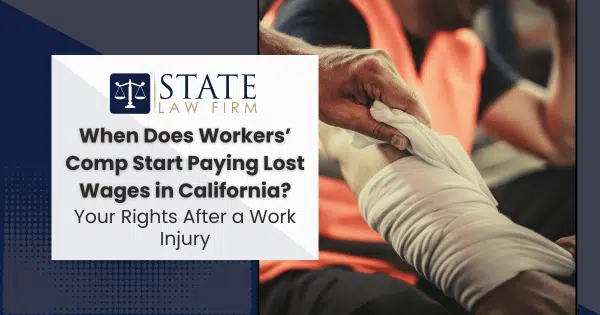En Bufete de abogados estatal, we understand how a work-related injury can turn your world upside down—suddenly, you’re facing medical treatment, missed workdays, and financial uncertainty. That’s why we’re here: as a boutique personal injury law firm based in Sherman Oaks, run by a team of passionate, youthful attorneys evolving into skilled litigators. We’re fiercely dedicated to guiding you through California’s workers’ compensation system—and helping you win the benefits you need when it matters most.
Did you know that about one-third of workers’ compensation claims in California result in temporary disability, with employees missing three or more workdays. This statistic highlights how common it is for injured workers to face lost wages—and why knowing when wage replacement begins can make all the difference.
In this guide, we’ll walk you through everything you need to know:
- Understanding Workers’ Compensation in California: Get grounded in the basics—your rights after a work injury, your employer’s responsibilities, and how the system works.
- The Process of Filing a Workers’ Comp Claim: Learn about claim forms, when to report injuries, and essential deadlines—before you feel lost in the paperwork.
- When Does Workers’ Comp Begin to Pay Lost Wages?: We’ll demystify the waiting period, explain exceptions, and break down the timeline for temporary disability payments.
- The Types of Benefits Available: From medical care to partial or permanent disability, we cover all the support you may be eligible for.
- Your Rights as an Injured Worker: From appealing denied claims to protection against retaliation, know what you’re entitled to.
- Common Reasons for Delays—and How to Avoid Them: Paperwork errors, communication breakdowns, and insurer tactics can slow things down. We’ll help you stay one step ahead.
Our team believes in a personal, client-first approach. If you’re injured in a bus crash in Fresno, you may benefit from working with a Fresno bus accident attorney. Keep that in mind as you explore your options.
Ready to take the next step? If you’d like a helping hand or a friendly voice to walk you through your options, don’t hesitate to reach out—learn how to schedule a consulta gratuita.
Understanding Workers’ Compensation in California
Workers’ compensation is California’s safety net for employees who are hurt on the job. It’s a no-fault system—meaning you don’t have to prove your employer was negligent to receive benefits. As long as your injury or illness is work-related, you may be entitled to coverage.
In California, workers’ comp typically provides:
- Medical treatment for your injury or illness
- Partial wage replacement while you recover
- Benefits for permanent impairments
- Support for retraining if you can’t return to your previous job
Your employer is required by law to carry workers’ compensation insurance, and they must provide you with a claim form (DWC-1) as soon as they know about your injury. Reporting promptly protects your rights and can help avoid unnecessary disputes.
Consejo profesional: Keep a detailed record of your injury, symptoms, medical visits, and conversations with your employer or insurance company—these notes can be critical if issues arise later.
The Process of Filing a Workers’ Comp Claim in California
The claims process can feel like a maze, but knowing the steps can help you move through it smoothly:
- Report the Injury Immediately – Tell your employer right away. You have up to 30 days, but sooner is always better.
- Complete a Claim Form (DWC-1) – Your employer should provide this form; fill out the employee section and return it promptly.
- Seek Medical Treatment – In an emergency, go to the nearest facility. Otherwise, follow your employer’s medical provider network guidelines.
- Employer Submission – Once you return the form, your employer sends it to their workers’ comp insurance carrier.
- Claims Administrator Review – The insurer reviews your claim and determines benefit eligibility.
Deadlines matter—if you miss them, you could lose your benefits. If you’re unsure about your timeline, our attorneys can help you stay on track.
When Does Workers’ Comp Begin to Pay Lost Wages?
California workers’ comp doesn’t start paying lost wages immediately. Generally:
- There’s a three-day waiting period before wage loss benefits (temporary disability payments) kick in.
- If your injury keeps you off work for more than 14 days, you’ll get paid retroactively for those first three days.
- Payments typically start within 14 days after your employer’s insurer learns your injury prevents you from working.
Temporary disability benefits usually cover two-thirds of your average weekly wages, up to a state-set maximum. Your treating doctor must confirm that you can’t work due to the injury for benefits to begin.
Consejo profesional: Keep in touch with your doctor and ensure medical updates are sent to the claims administrator—delays in documentation can delay your payments.
The Types of Benefits Available Under California Workers’ Comp
Depending on your situation, you may be eligible for:
- Wage Loss Benefits – Temporary or permanent disability payments to replace a portion of your lost income.
- Medical Care – Coverage for necessary treatments, medications, surgeries, and rehabilitation.
- Vocational Rehabilitation – Help with training or finding new work if you can’t return to your previous job.
- Permanent Disability Benefits – Compensation for lasting impairments.
These benefits are designed to work together so you can focus on healing—not worrying about your bills. Still, insurance companies may try to limit payouts, which is why having experienced advocates on your side can make a difference.
Your Rights as an Injured Worker in California
California law provides strong protections for employees who suffer job-related injuries. You have the right to:
- Receive all benefits you’re entitled to under the law
- Seek medical treatment without paying out of pocket.
- Be protected from retaliation for filing a claim.
- Appeal a denied claim or disputed benefit amount.
If you believe your rights are being violated, you don’t have to face it alone. Our attorneys can step in to make sure your voice is heard and your case gets the attention it deserves.
Common Reasons for Delays in Wage Payments and How to Avoid Them
Even legitimate claims can face delays. Some common reasons include:
- Incomplete or Incorrect Paperwork – Missing information can stall processing.
- Delayed Medical Documentation – Without updated reports, payments may stop.
- Employer or Insurer Disputes – Disagreements over whether the injury is work-related.
How to avoid delays:
- File promptly and keep copies of every document you submit.
- Follow up regularly with your claims administrator.
- Get help from an attorney if you notice unusual delays or denials.
Protect Your Rights and Ensure Timely Compensation After a Work Injury in California
When you’re recovering from a work injury, every paycheck matters. Understanding your rights, the claim process, and how to avoid delays can help ensure your benefits arrive on time.
If you’re unsure about your claim—or you’ve hit a roadblock—our team at State Law Firm is here to help. We’re not just here to process paperwork; we’re here to fight for you. Learn more about how we can support you by scheduling a consulta gratuita hoy.


